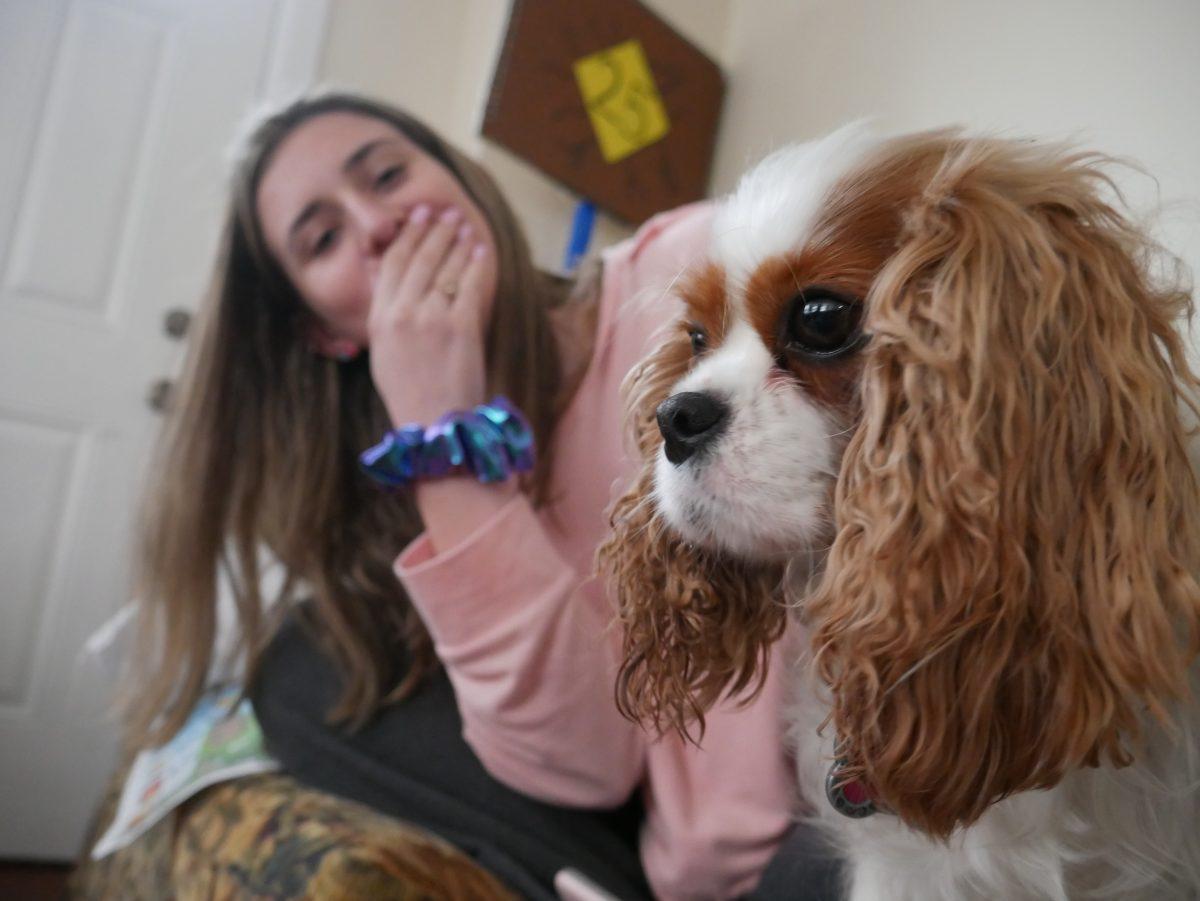Pippa, who lives in the Whitney Center residence hall, has curly brown hair and large brown eyes; her legs are short, and she isn’t the most athletic of her suitemates. She’s something of a picky eater, and she loves wearing cute clothes.
In her time at Rowan, she’s only peed on any given floor a maximum of two or three times.
Pippa is a Cavalier King Charles Spaniel, and also a registered emotional support animal (ESA) belonging to junior biomedical engineering major Hannah Doyle. Registered through Rowan’s Disability Services, Pippa is an integral part of how Doyle copes with her anxiety and panic disorder that was diagnosed during her freshman year at Rowan.
“She definitely helps a lot with my anxiety,” Doyle said. “When I start to feel anxious, I’ll just pick her up and hold her. Even when I’m just doing homework, she always wants to be with me. When I start to panic, she really helps to bring me back to the present. She also gives me ways to cope – when I’m anxious, I can get up and take her for a walk, and then return back to my homework.”
Under the Fair Housing Act, ESAs are considered a “reasonable accommodation” for disabled people, and not considered pets by the U.S. Department of Housing and Urban Development. While service animals are dogs trained to perform specific tasks, ESAs can be any species and do not require training to benefit their owners emotionally.
Doyle’s therapist held off on recommending a therapy dog until she believed that Doyle was stable enough to take care of an animal on her own. She also had some requirements for any dog in question: it had to be registered as a Canine Good Citizen (a dog which can abide commands to sit and stay, and also be okay on its own for reasonable spans of time) and preferably not a puppy.
Though a registered therapy dog was recommended, the cost of obtaining one specially trained to Doyle’s needs was between $75,000 and $150,000 and over a year of training. Together with her family and therapist, Doyle decided to get an ESA that she could potentially teach therapy techniques – a process that only lasted a few months, and which Doyle describes as “99% cheaper” than a therapy dog.

Doyle stresses that anyone interested in registering an ESA be aware of the responsibility of taking care of an animal, especially for those who may have trouble caring for just themselves. She also recommends having an external support system for taking care of the animal in the event of an emergency.
“I spend a lot of time with Pippa,” Doyle said. “That was one of the big things that my parents made me consider when I was getting her, because in spring of 2019, I was having a lot of anxiety problems. My parents were like, ‘If you get this dog, and there’s ever a week where you have too much work and you don’t think you can take care of her, you need to call us and we can come get her.’ Luckily I’ve never needed that.”
According to Assistant Vice President for Residential Learning and Inclusion Programs Dr. Travis Douglas and Director of the Academic Success Center and Disability Resources John Woodruff, there are currently 78 registered ESAs and four registered service animals on Rowan’s campus. In an effort to keep public spaces inclusive, however, RLUH recognizes that a furry companion may not be suitable for all students.
“Because ESAs are not trained or certified to perform a specific task or service, federal laws do not require that ESAs be permitted in classrooms or other public spaces,” Douglas said. “Because other individuals may have allergies to ESA animals, they are not permitted in academic spaces or in most other indoor other spaces such as the Student Center, Dining Halls or Rec Center.”
While Rowan’s offices do not currently track whether ESAs improve student outcomes in grades or retention, Doyle believes that Pippa has improved her life considerably. This is a sentiment that one of her roommates, senior environmental and sustainability studies major Steph Evans, agrees with.
“I knew Hannah last year,” Evans said. “I knew how stressed she was last semester, as well, and she’s still stressed, but I feel like she took it in strides with Pippa with her. She’d come home upset, and then Pippa would be there to cheer her up, and then she’d be fine.”

A student can register an ESA by filling out a form from Disability Services on the second floor of Savitz Hall; Douglas adds that “a form also needs to be filled out by both [the student’s doctor] and a veterinarian.”
“Her companionship helps me a lot,” Doyle said. “I have other pets at home, but my relationship with Pippa is a lot different. She depends on me for food and stuff, but I depend on her, too, in a way that you wouldn’t normally depend on your pet.”
For comments/questions about this story, email [email protected] or tweet @TheWhitOnline.

























































































































































!["Working with [Dr. Lynch] is always a learning experience for me. She is a treasure,” said Thomas. - Staff Writer / Kacie Scibilia](https://thewhitonline.com/wp-content/uploads/2025/04/choir-1-1200x694.jpg)









































